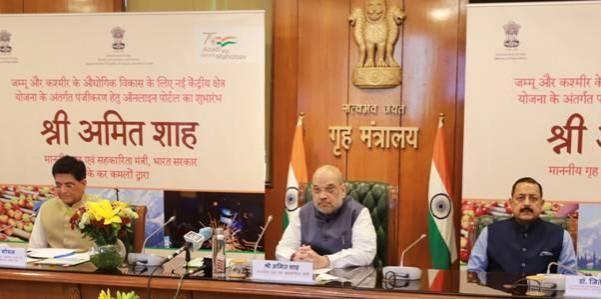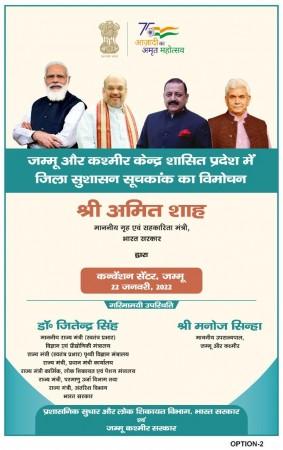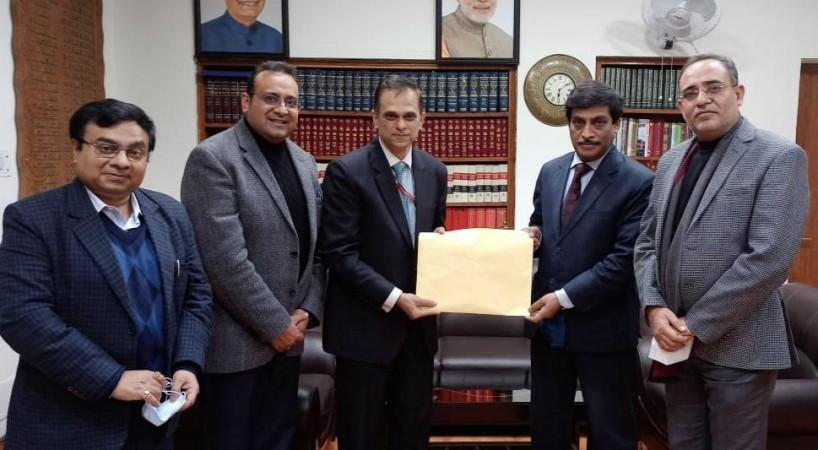Union Home and Cooperation Minister Amit Shah will release the District Good Governance Index (DDGI) for 20 districts of the Union Territory of Jammu and Kashmir on Saturday.
This programme will be organized jointly by the Department of Administrative Reforms & Public Grievances (DARPG), Union Government, and Jammu & Kashmir Institute of Management, Public Administration & Rural Development in association with the Centre for Good Governance, Hyderabad.
Dr. Jitendra Singh, Union Minister for Personnel, Public Grievances and Pensions, and Manoj Sinha, Lieutenant Governor of Jammu and Kashmir, will also address the event.

The District Good Governance Index of Jammu and Kashmir was prepared by DARPG in collaboration with the Government of Jammu and Kashmir in pursuance of the announcements made in the "Behtar e-Hukumat – Kashmir Aelamia" resolution adopted on July 2, 2021, in the Regional Conference on Replication of Good Governance Practices held at Srinagar.
The exercise on the formulation of the District Good Governance Index was set in motion in July 2021, which has now been completed and Jammu & Kashmir will become the first Union Territory in the country to have a Good Governance Index.
J&K will become first UT to have a Good Governance Index
The District Good Governance Index of the Government of Jammu and Kashmir represents a major administrative reform in benchmarking good governance at the district level and a significant step for timely collation and publication of statistics at the state and district level.
The District Good Governance Index is a milestone and it is expected that it will provide a robust framework for evidence-based assessment of the performance of all the districts in Jammu & Kashmir.
The Chief Secretary Government of Jammu & Kashmir Arun Kumar Mehta and V. Srinivas, Secretary DARPG, Government of India will also be addressing the event.

During the occasion, a presentation on the formulation of the District Good Governance Index will be made by the Centre for Good Governance, Hyderabad. This will be followed by district presentations by selected 12 District Development Commissioners, who will be showcasing achievements of various sectors. Thereafter a panel discussion will be held on DGGI- A Way Forward for futuristic 2.0 version of DGGI for measuring and benchmarking performance and improvement of Districts in the future as well.

The first copy of DDGI presented to Chief Secretary J&K
The Union Secretary, Department of Administrative Reforms and Public Grievances (DARPG), V Srinivas today presented the first copy of DGGI to Chief Secretary, Dr. Arun Kumar Mehta.
The maiden exercise is the sequel to the many administrative reforms taken in hand by the J&K administration post-August, 2019. The exercise is the first of its kind in the country where districts have been rated as per their score computed on public feedback and reforms taken in making the governance process simple, swift, innovative, accessible, and accountable.
A milestone in providing people-friendly administration
On the occasion, the Chief Secretary termed it as a milestone in improving the overall culture of offering people-friendly administration with an inherent sense of accountability along with transparency in its functioning.
He said the exercise is a prelude to the umbrella process taken by the government to make governance more responsive, reformative, reasonable, rational, and accessible at the doorsteps of people.
58 indicators from different sectors
It is informed that the DGGI framework has 58 indicators drawn from different aspects of development and district administration. It encompasses 10 sectors such as agriculture and allied sector, commerce and industry, human resource development, public health, public infrastructure and utilities, economic governance, welfare and development, public safety and judiciary, and citizen-centric governance in computing the overall score of the district in the index.
After an elaborate exercise of data collation followed by data sanitization the final index was computed using standard and tested data normalization and scoring methods, as was revealed on this occasion.
The index would reflect the comprehensive rank of districts based on a composite of 10 sectors. The DGGI will also offer a window on the indicator-wise performance of the districts, a much easier way of understanding their performance on the governance process, as was said by the concerned officers during this official event.









!['Had denied Housefull franchise as they wanted me to wear a bikini': Tia Bajpai on turning down bold scripts [Exclusive]](https://data1.ibtimes.co.in/en/full/806605/had-denied-housefull-franchise-they-wanted-me-wear-bikini-tia-bajpai-turning-down-bold.png?w=220&h=138)



